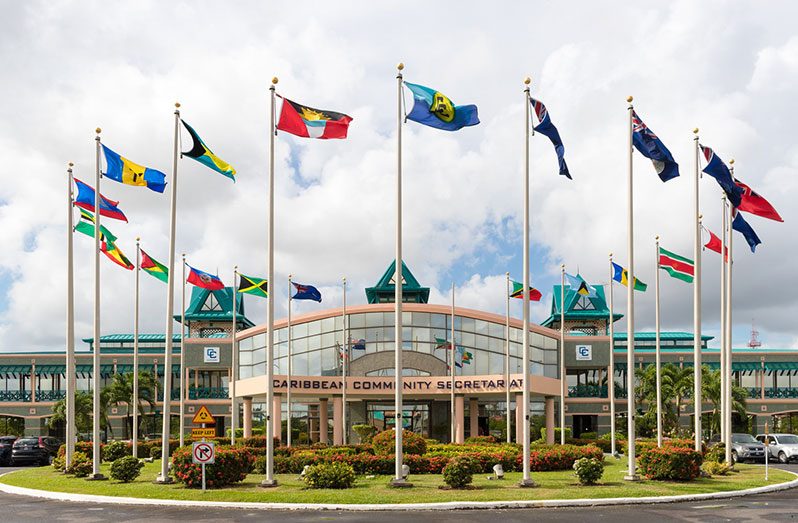–bloc reiterates support for Guyana in ongoing border controversy
VENEZUELA’S “threatening posture” in the ongoing border controversy with Guyana remains a concern for the Caribbean Community (CARICOM), which reiterated its position following the conclusion of the 32nd inter-sessional meeting of CARICOM Heads of Government, on Thursday.
The Guyana-Venezuela border controversy relates to a more than century-old disagreement, which arose as a result of Venezuela’s contention that the Arbitral Award of 1899, which outlines and settles the boundary between the two nations, was null and void.
According to a communiqué from CARICOM, Heads of Government remain “very concerned” about the threatening posture of Venezuela and have reaffirmed their support for the maintenance and preservation of the sovereignty and territorial integrity of Guyana.
In March 2018, Guyana filed its application in the International Court of Justice (ICJ) seeking an affirmation of the validity of the 1899 Arbitral Award and the international boundary that it established. The ICJ ruled on December 18, 2020, that it has jurisdiction to hear the border controversy case.
Guyana is seeking to obtain a final and binding judgement that the 1899 Arbitral Award, which established the location of the land boundary between then British Guiana and Venezuela, remains valid, and that the Essequibo region belongs to Guyana and not Venezuela.
Venezuela has said, for the longest while, that it is not interested in having this matter resolved by the court. And, the country remains seemingly bent on arbitrarily laying claim to Guyana’s territory, with its naval forces intruding on Guyana’s maritime space.
Increased activity by Venezuelan naval vessels and other forces in Guyana’s Exclusive Economic Zone (EEZ) started after Venezuela’s President Nicolás Maduro, issued a decree claiming Venezuela’s sovereignty and exclusive sovereign rights in the waters and seabed adjacent to Guyana’s coast, west of the Essequibo River.
Despite outright condemnation of Venezuela’s latest claims and global recognition of Guyana’s sovereign rights over the contested area, a naval vessel attached to the Bolivarian Republic, just days after the issuance of the decree, had entered Guyana’s territory and abducted 12 fishermen, who have since been released.
Heads of Government of CARICOM noted, with satisfaction, that the cumulative effort of the region contributed to the unconditional release of the fishing vessels and crew.
That matter aside, the fact remains that the border controversy is still active. But CARICOM believes that the ongoing judicial process will bring a peaceful and definitive end to this matter, especially if Venezuela participates in the process.
A peaceful conclusion to its border controversy with Venezuela remains Guyana’s aim, but with the opposing state insisting on aggression, Commander-in-Chief of the armed forces and President of Guyana, Dr. Irfaan Ali, has affirmed that his nation will not cower in the face of threats against national security.
“As President of our beloved country, my single most important responsibility is to keep the Guyanese people safe. It is the first thing I think about when I wake [up] in the morning. It is the last thing on my mind at night. And my working day is consumed by it.
“But I want no mistake made about it: my government is doing all in its power to vigorously protect our people’s health and our country’s territorial integrity. Just as we will not relent in the battle against COVID-19, so will we not bend to threats to our national security…we may be a small country, but we are a proud people. We have no military might, but we have moral and legal right. We pick fights with no one, but we will resist threats from anyone,” President Ali said during a recent address to the nation.
The most recent international stakeholder to add its voice to this matter has been the United Nations (UN) through Secretary-General, Antonio Guterres. According to President Ali, Guterres, in a letter, made reference to January 30, 2018, when he chose the ICJ as the means to be used for solution of the controversy.
The secretary-general acknowledged that the court is proceeding to adjudicate the merits of the case.
“Guyana is fully committed to the ICJ process. We believe international law and independent international jurists of the highest caliber offer the most credible and definitive way in which to put an end to the Venezuelan contention. Therefore, we will continue to pursue that course,” President Ali said.
At the same time, however, Guyana, he said, is not averse to engaging Venezuela on bilateral matters in which we have a common interest.




.png)









